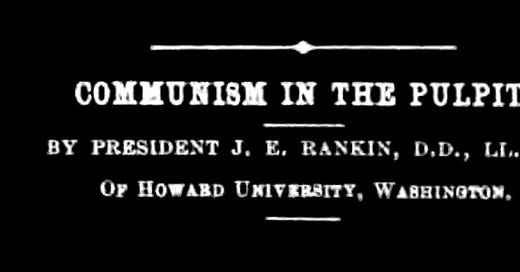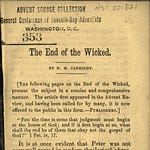When, last Sunday night, I heard a celebrated College Professor of (Mis) Applied Christianity say of the Being whom he always called “Jesus” that he died “a disappointed man.” I thought of some words to the contrary in Isaiah, such as these: “He shall not fail or be discouraged till he have set judgment in the earth, and the isles shall wait for his law”; “Thus saith the Lord, I that have called thee in righteousness will hold thy hand and will keep thee.” I thought, too, of the Master's own words, when he lifted up his eyes to Heaven, saying: “Father, the hour is come; glorify thy Son, that thy Son, also, may glorify thee; as thou hast given him power over all flesh, that he should give eternal life to as many as thou hast given him” and “I have finished the work which thou gavest me to do.” This language is not that of disappointment. I believe Christ saw of the travail of his soul and was satisfied; that the words “It is finished” were words of triumph.
When, on Monday night, before the Congregational Club, this same Jeremiah of Iowa said that the “revelation of Jesus was a social idea,” “the career of Jesus was as truly political as that of Mazzini or Sumner”; "that Jesus was crucified for disturbing the social order of things”; and “Jesus went at Jerusalem more truly than Parkhurst at New York, and far more wisely.” I thought of the Master's own words when near the end: “My kingdom is not of this world, else would my servants fight; but now is my kingdom not of this world”; and “Put up thy sword within its sheath: he that taketh the sword shall perish by the sword” and “I could pray the Father and he would send me twelve legions of angels.”
And when I heard from this pessimist prophet of the West that the baptism of the Holy Ghost on the day of Pentecost, only meant communism of goods, I wondered how the Holy Spirit should have so misled the Apostle Peter, who preached the usual doctrine of repentance toward God and faith in the Lord Jesus Christ, and not communism at all. And when I heard that the kingdom of God was confined by “Jesus” to the present life, I wondered at the prayer of the dying thief; “Lord, remember me when thou comest into thy kingdom,” and at the Savior's answer, “This day shalt thou be with me in Paradise.” Strange promise for a disappointed man— a man dying as a felon to make.
And when the same Savonarola of the West said that the Pilgrim Fathers were all once Communists, I thought of the summing up of their experience in the words of Governor Bradford:
“The experience that was had in this commune course and condition tried sundry years, and that amongst godly and sober men, may well evince the vanity of that conceit of Plato’s and other ancients applauded by some of later times; that the taking away of property and bringing in community into a commonwealth would make them happy and flourishing, as if they were wiser than God. For this community was found to breed much confusion and discontent.”
Among many things that are excellent and beautiful in phrase there seems in the make up of this accomplished professor from Iowa a vein of pessimism, a disposition to wrest the truth, an unconscious misstatement of historical facts, which make his addresses disturbing and unwholesome. Does he regard himself as having a prophetic mission to this generation? Has he taken Savonarola as his model? Is he the John the Baptist of Anarchy? When we heard his diatribe against the Christian Church we could not help saying to ourselves: “This way madness lies!” There is no safe and wholesome study of sociological problems, but when we try to grapple with them personally. The men and women who are doing something practical to even things, to make the crooked straight and the rough places plain, to cast up a highway for our God, are not discouraged and do not discourage others. There is no pessimism about them. They encourage themselves in God. They do not say to the Christian Churches, “Tear down and build over again,” but “Lend a hand, while we try our best to make things better.” If we regard Christendom up to date as a failure, and the Founder of Christianity, a “disappointed” man, is this new Gospel of Communism likely to better matters? Are we to build success on the broken-down foundations of Christianity? If Jesus of Nazareth failed, who can succeed? This “conceit of Plato's and other ancients, applauded by some of later time?”
Hardly.












Share this post